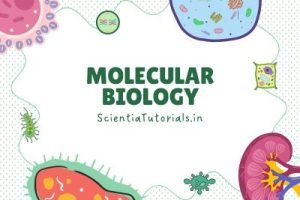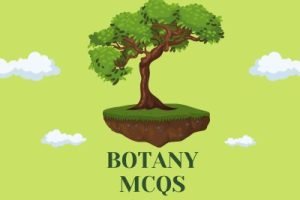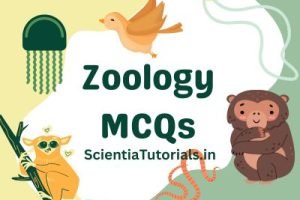MCQs on Cell Organelles
MCQs on Cell Organelles
1. Which of the following cell organelles is absent in animal cells and present in a plant cell?
(a) Cell wall
(b) Cytoplasm
(c) Vacuoles
(d) Mitochondria
Sol: (a) Cell wall.
2. Which of the following cell organelles does not contain DNA?
(a) Nucleus
(b) Lysosomes
(c) Chloroplast
(d) Mitochondria
Sol: (b) Lysosomes.
3. Which of the following statements is true about the cell wall?
(a) The cell wall is mainly composed of lipid
(b) The cell wall is mainly composed of starch
(c) The cell wall is mainly composed of protein
(d) The cell wall is mainly composed of cellulose
Sol: (d) The cell wall is mainly composed of cellulose.
4. Which of the following statements is true about cell theory?
(a) The Cell theory does not apply to fungi
(b) The Cell theory does not apply to virus
(c) The Cell theory does not apply to algae
(d) The Cell theory does not apply to microbes
Sol: (b) The Cell theory does not apply to the virus.
5. ___________ is a jellylike substance found floating inside the plasma membrane.
(a) Cell sap
(b) Cytoplasm
(c) Karyoplasm
(d) Mitochondria
Sol: (b) Cytoplasm.
6. Which of the following cell organelles is called the powerhouse of the cell?
(a) Nucleus
(b) Lysosomes
(c) Chloroplast
(d) Mitochondria
Sol: (d) Mitochondria.
7. Which of the following cell organelles regulates the entry and exit of molecules to and from the cell?
(a) Lysosomes
(b) Golgi bodies
(c) Cell membrane
(d) Mitochondria
Sol: (c) Cell membrane.
8. _____________is the study of the cell, its types, structure, functions and its organelles.
(a) Biology
(b) Cell Biology
(c) Microbiology
(d) Biotechnology
Sol: (b) Cell Biology.
9. Which of the following cell organelles is called a suicidal bag?
(a) Lysosomes
(b) Golgi bodies
(c) Cell membrane
(d) Mitochondria
Sol: (a) Lysosomes.
10. Which of the following cell organelles is absent in prokaryotic cells?
(a) Nucleus
(b) Lysosome
(c) Endoplasmic Reticulum
(d) All of the above
Sol: (d) All of the above.
11. Which of the following cell organelles is involved in the storage of food, and other nutrients, required for a cell to survive?
(a) Vacuoles
(b) Lysosome
(c) Mitochondria
(d) Cell membrane
Sol: (a) Vacuoles.
12. Which of the following cell organelles is involved in the breakdown of organic matter?
(a) Lysosomes
(b) Cytoplasm
(c) Golgi bodies
(d) Mitochondria
Sol: (a) Lysosomes.
13. _____________ is involved in the synthesis of phospholipids.
(a) Mitochondria
(b) Cytoplasm
(c) Endoplasmic Reticulum
(d) Smooth Endoplasmic Reticulum
Sol: (d) Smooth Endoplasmic Reticulum.
14. Which of the following cell organelles is present in plant cells and absent in animal cells?
(a) Nucleus
(b) Vacuole
(c) Chloroplast
(d) Cytoplasm
Sol: (c) Chloroplast.
15. Which of the following statements is true about chromosomes?
(a) It is present within the nucleus
(b) It carries genes and helps in inheritance
(c) It is composed of DNA in the form of Chromatin and protein
(d) All of the above
Sol: (d) All of the above.
16. Which of the following is a single membrane-bound organelle?
(a) Vacuole
(b) Golgi Apparatus
(c) Endoplasmic Reticulum
(d) All of the above
Sol: (d) All of the above.
17. Which of the following cell organelles is present in animal cells and absent in plant cells?
(a) Nucleus
(b) Centrosome
(c) Golgi bodies
(d) All of the above
Sol: (b) Centrosome.
18. Which of the following is not a double membrane-bound organelle?
(a) Chloroplast
(b) Mitochondria
(c) Endoplasmic Reticulum
(d) All of the above
Sol: (c) Endoplasmic Reticulum
19. Which of the following statements is true about the Golgi bodies?
(a) It is a sac-like organelle
(b) It is located near the nucleus
(c) It helps in transporting the particles throughout the cell.
(d) All of the above
Sol: (d) All of the above.
20. Which of the following statements is true about the Nucleus?
(a) It is absent in prokaryotes
(b) It is called the brain of the cell
(c) It contains DNA and other genetic materials.
(d) All of the above
Sol: (d) All of the above.



